Results
-
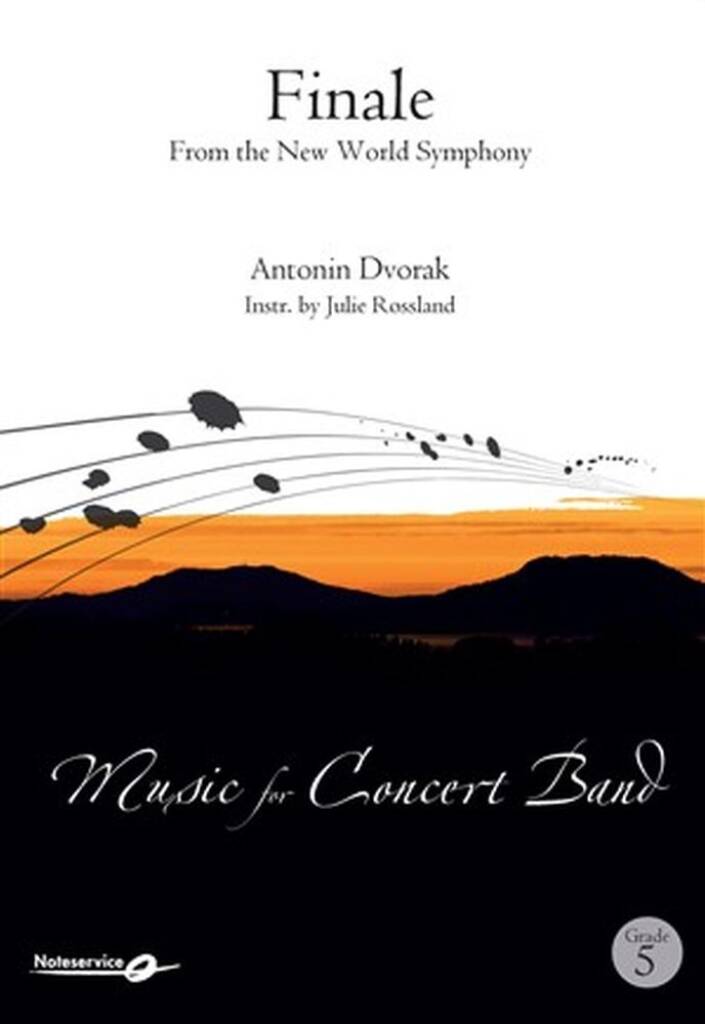 £183.20
£183.20Finale from The New World Symphony - Antonin Dvorak
This arrangement was written for Norwegian School Band Madlamark Skolekorps to their participation at the Norwegian Championships 2023.The arrangement will work excellent also for a wind ensemble (one player to each part), but the clarinet parts should always be doubled.Euphonium II is optional, but it's recommended to use also this when there are two players or more on this instrument. Concerning percussion, timpani is the most important part, but it's recommended to also cover cymbals and mallet percussion.The articulation and dynamics are kept as close as possible to the original version by Dvorak. However, some changes has been made to make it more suitable for a wind instrumentation. The timpani part is identical to the original version except for some places when the trumpet signals are doubled in the timpani part.Staccato notation should not be played short here, but rather separated. At faster passages, the music should be played endurant or legato if possible.This arrangement is a good opportunity to perform music of highest quality where musicality, phrasing, balance and intonation are very important, and, where each musician and part are deeply involved in the music making.
Estimated dispatch 7-14 working days
-
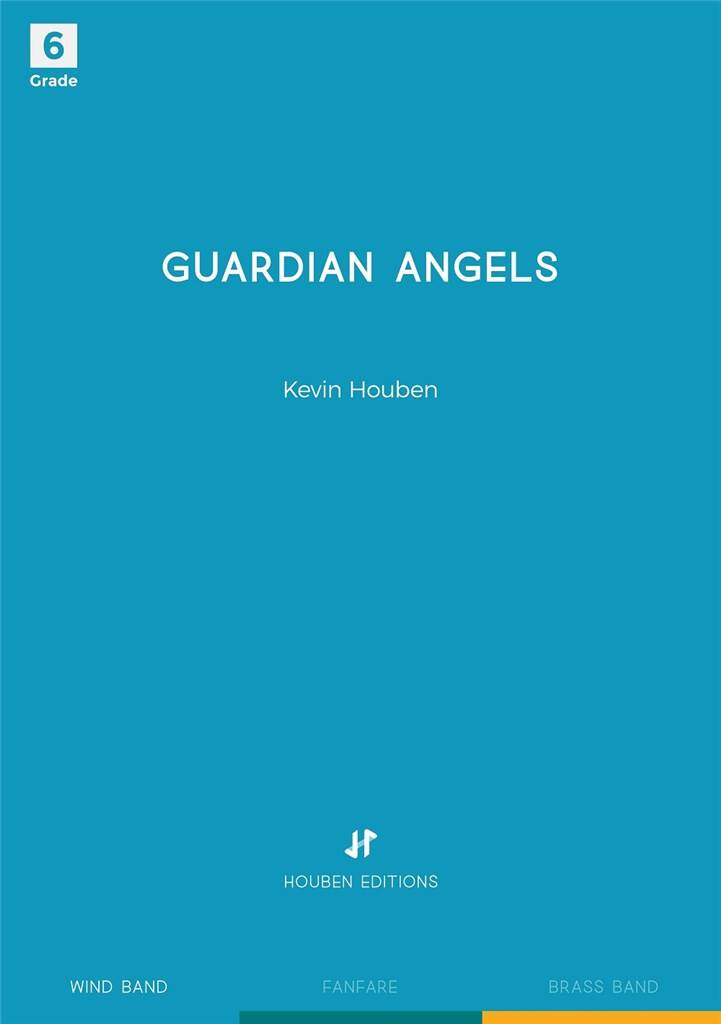 £159.99
£159.99Guardian Angels - Kevin Houben
Guardian Angels gives a musical expression to the legend of Reverend Louis Henri Bhler referring to the use of Psalm 34.North-west Veluwe and in particular Oldebroek (The Netherlands) has a very rich religious tradition which is demonstrated by its monumental churches. They tell the story of a stirring history in which Reverend Bhler played a crucial role. Inspired by his arrival as a pastor in 1870 in the neighbouring Oosterwolde, two big religious communities came into existence with their characteristic churches but this rivalry also resulted in great social unrest.This composition reflects on this striking personality and in particular on the story of the Angel Guard.'One evening Reverend Bhler has given a sermon in Oldebroek and he walks over the Church path through the pastures to Oosterwolde. On this dark and stormy evening Bhler's opponents are waiting for the pastor in ambush. They want to drown him in a watercourse near the Church path but abandon their plan because Bhler is accompanied by two men. The next day it comes to an encounter between Bhler and his opponents. They repent their, fortunately unexecuted , plan. Bhler firmly believes that on the previous night he walked alone over the Church path, and was not accompanied by two men. It was concluded that it must have been the angels who had protected Bhler.'Psalm 34 is central to this composition and this because of its powerful melody but also because the lyrics of verse 4 of the rhymed version fit in well with the special legend of Reverend Bhler:The Lord's angel gathered round himAn invincible heavenly guard,Who tries God's will, around himSo he's well guard(ed)A second melodious and harmonic cell is a musical transformation of the name 'Bhler'. This cell is varied in major and minor third chords and sometimes used as the main idea or apotheosis, but also serves as an accompanying cell or as a bridge between other melodic and rhythmic constructions.The composition was made possible by contributions of: Mr Evert van de Poll, owner of the Van Gelder Groep, Het Prins Bernhard Cultuurfonds Gelderland en Het Feteris Oosterbaan Fonds.
Estimated dispatch 7-14 working days
-
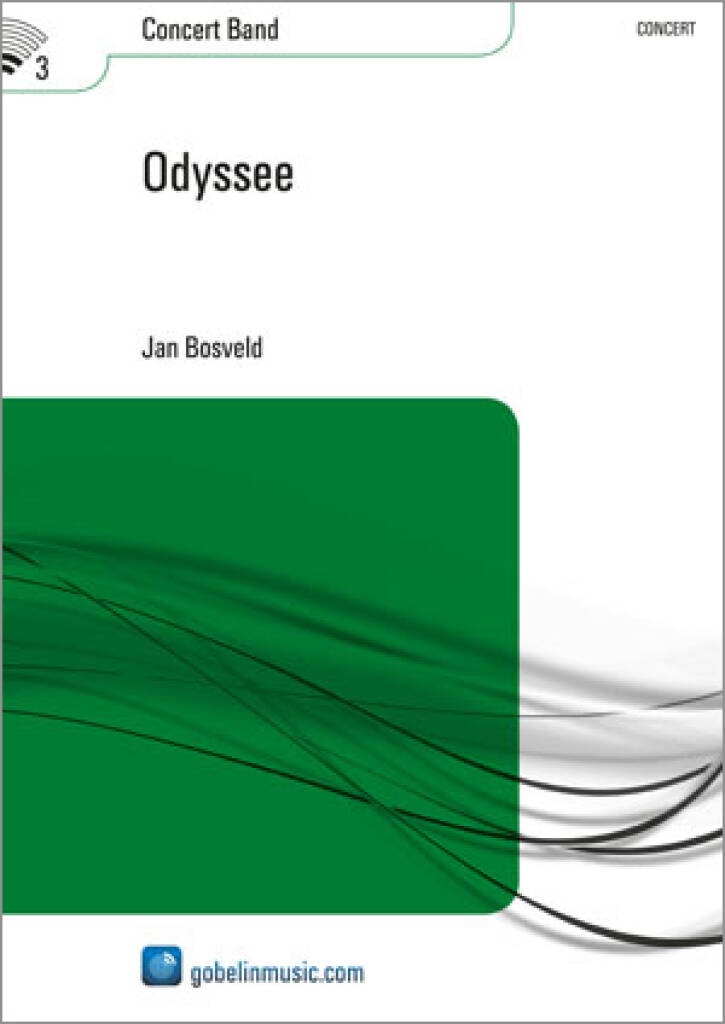 £137.99
£137.99Odyssee - Jan Bosveld
The Odyssee tells the story of Odysseus, the undaunted hero. In times long ago the blind poet Homer wrote this famous epic. The "Odyssey" follows the "Iliad", the story of the bloody war between the Greek and the Trojans. This battle endsafter ten years thanks to the Odysseys famous trick. the Trojan Horse. The Odyssey is not a war epic, but a story about perseverance, loyalty, adventure, and the survival instinct of its ingenious hero. In The Odyssey, Homer describes howOdysseus, the king of Ithaca, had to endure another ten years of affliction after the ten years of war in Troy before he could finally return to his home land. During those years, his wife, Penelope, had to try and keep her many admirers away.These men not only wanted het hand but also the kingship. To prove her husbands worth, she played a trick: "As soon as I have finished weaving this shroud for my father-in-law, Laertes, I will choose one of you to become my husband", she promisedthem. But during the night, she secretly loosened what she had woven during the day, prolonging the time until Odysseus would finally return. After twenty long years, when he finally stood at the door, she wondered: Is this really my husband? Ishe an imposter? Cunningly, she asked him to move the bed, because only she and her husband know that the bed was immovable and was build around an old three trunk! Odysseus was deeply moved: this really was his wife, his Penelope! Nearly threethousands years later, the loyalty and strength of this character, and all the dangerous adventures that Odysseus survived thanks to courage and intelligence, still moves us today. Odyssee by Jan Bosveld is not just an adventure story, butrather a characteristic piece in which memories of Homers story can be heard. The composition opens with a firm, stirring theme describing our hero, Odysseus, in detail: This man is not to be taken lightly. The further development of thisshort introduction completes this character sketch: trustworthy, perseverant, and a genius. After that we can picture Odysseus on the lonely beach of Ogygia. Do the trumpets depict his memories of the war of Troy? Does he think of his wife, as werecognise the weaving loom of Penelope in the murmuring eighth? In the solemn, plaintive part that follows, we can imagine Penelope feeling lonely, sitting in the womens room with her servants.One of the girls plays the harp, but that does notclear the sombre atmosphere. Then we can imagine seeing the sorceress Circe, who changed Odysseus men into swine. After she gives a simple magic sign something follows that reminds us of the sound of pigs grunting. Then the Odysseus theme resounds:the hero comes to savi his comrades. Assisted by Hermes, he forces Circe to lift the spell. The piece ends the same way as it began, with an animated theme: Odysseus is still the same, undefeated and not to be taken lighty!
Estimated dispatch 7-14 working days
-
 £309.99
£309.99Vulcan - Michael Daugherty
(2014) Vulcan for Concert Band is Grammy award winning composer Michael Daugherty's first work for the high school and intermediate level college band. The work is a colorful homage to Gene Roddenberry's interstellar universe as depicted in the classic American television series Star Trek (1966-69). The title refers to the fiery planet Vulcan, home world of half-human, half-Vulcan Mr. Spock. As the rational-minded science officer aboard the starship Enterprise (commanded by the hot-blooded Captain James T. Kirk), Mr. Spock grapples with the fascinating predicament of making decisions predicated on human emotion versus Vulcan logic. Daugherty has composed stirring, yet highly structured music that alludes to the Vulcan Pon Farr ritual, Vulcan telepathic mind-melds, and the volcanic planet itself. At the the Ann Arbor, Michigan world premiere (utilizing the combined forces of the Pioneer, Huron and Skyline High School bands), Vulcan was an immediate hit and will surely become one of Daugherty's most performed works. Instrumentation The number of players doubling each part is at the conductor's discretion, but should be in keeping with a balanced sound. Piccolo 2 Flutes 2 Oboes English Horn (optional but recommended) 3 Bb Clarinets (minimum 2 players per part) 2 Bb Bass Clarinets Eb Contralto Clarinet or Bb Contrabass Clarinet and Bb Bass Saxophone (optional but recommended) 2 Bassoons 2 Eb Alto Saxophones Bb Tenor Saxophone Eb Baritone Saxophone 3 Bb Trumpets (straight metal mutes, harmon mutes-stem out) 2 F Horns 2 Trombones (straight metal mutes) Euphonium 2 Tubas Contrabass or Electric Bass (optional but recommended) Timpani (4 drums recommended) Percussion (instruments are not shared): 1. Glockenspiel, Xylophone 2. Vibraphone, Small Anvil (metal beater) 3. Shakaray, Marimba, Chimes, Suspended Cymbal (yarn mallets) 4. Two Tam-Tams (small, medium), Tambourine, Mark Tree, Finger Cymbals, Vibraslap, Piccolo Snare Drum 5. Tenor Drum, Maracas, Snare Drum 6. Large Bass Drum Movement I (YouTube) Movement II (YouTube) Movement III (YouTube)
Estimated dispatch 7-14 working days
-
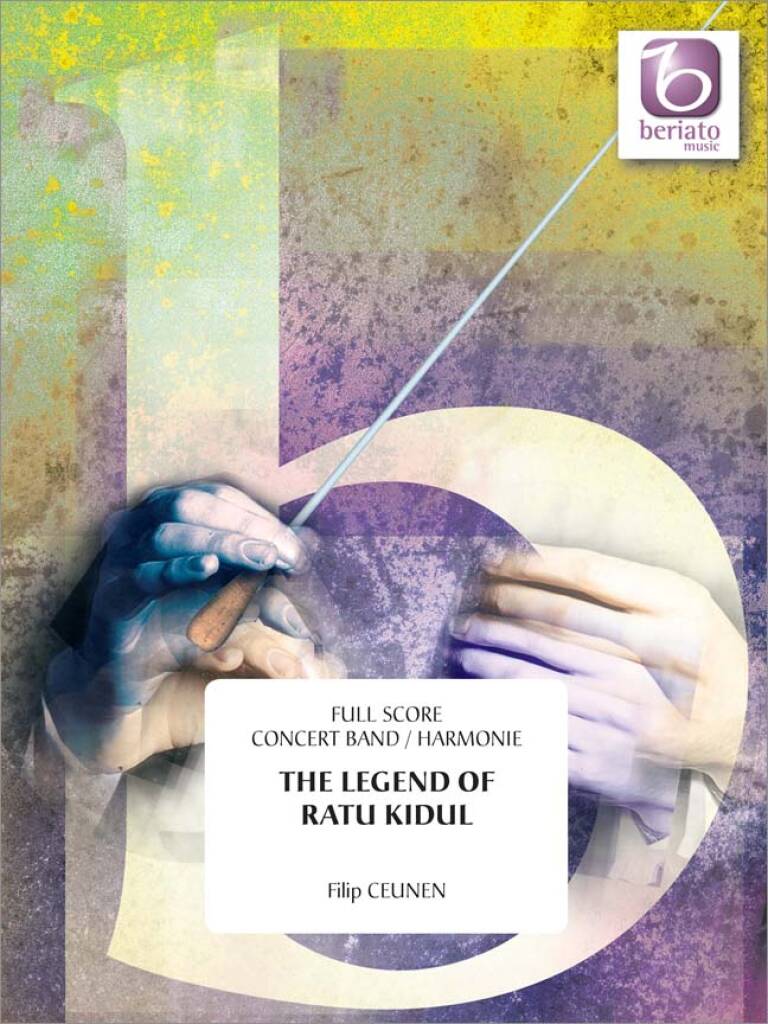 £134.99
£134.99The Legend of Ratu Kidul - Filip Ceunen
The Legend of Ratu Kidul carries us into the world of Indonesian mythology, on the island of Java:Once upon a time, the Queen of the Southern Seas was a kind and beautiful princess. She was the daughter of Prabu Munding Wangi, the favourite ofthe entire court and the local people. Her royal father doted on his daughter. Her name was Dewi Kadita, but many called her Dewi Srengenge or the Angry Princess.Prabu Munding Wangi longed for an heir, but Dewi Kadita's mother couldn't fulfil thiswish. So he took a second wife, called Poetri Moentiara, who was very jealous of the lovely princess and her mother. She begged the king to banish both her rivals from court. However Prabu Munding Wangi didn't do as she asked. He loved his first wifeand her daughter. The second wife bore him a healthy heir, but the monarch remained firm. So Poetri Moentiara called upon the renowned witch, Djahil. She promised her a princely reward, if Dewi Kandita and her mother were banished. Djahil thought fora moment and incanted this rapal (spell): "May leprosy befall you both". Soon both mother and daughter began to suffer this dreadful disease. According to the law of the land, they were to be banished to the wild forest high on the mountain. With aheavy heart, King Munding Wangi saw the law carried out. So the two set off on their way to the forest, covered in terrible sores. A great sadness fell across the land, except for Poetri Moentiara, the second wife of the king, who had achieved heraim. The princess fell on hard times. In the forest lived a hermit, who took pity on the mother and daughter. The queen couldn't bear the shame and within a few days had died. Now Dewi Kandita was all alone in the world. There was still the hermit,however, who fortunately provided food and shelter in a cave temple. He bound her weeping sores but couldn't relieve her emotional pain. Dewi Kandita became increasingly bitter and eventually left the hermit. She travelled southward from village tovillage, further and further, until eventually she reached the shores of the Southern Sea. She climbed upon a high cliff and gazed out onto the sea that spread before her. She was tempted to dive into the deep green and blue. In the cool waters shewould be able to forget all her pain and suffering. Suddenly awaking from these thoughts, she jumped into the deep. The gods, who had looked on Dewi Kandita throughout her hardships, were filled with deep compassion. So they transformed her into apowerful spirit of the netherworld, Ratu Kidul, and to this day she resides in her grand palace under the sea.
Estimated dispatch 7-14 working days
-
£264.99
Diferencias on an Old Spanish Song - Yasuhide Ito
I am immensely happy that my Gloriosa, symphonic poem for band (1990), has been performed by so many bands in the last thirty years.During this period, the growth of the internet has made it much easier to access information.When I composed Gloriosa, I only had limited information about the period when Christianity and Western music was first introduced to Japan, and had to rely a lot on my imagination.However, nowadays, it is easy to obtain various source materials and to read interesting studies on the music of the past.In recent years, the music of Luis de Narvez (born ca.1500 - died between 1555-1560), Spanish composer and vihuela player, has become increasingly known, and several CDs of his music are now available.Narvez composed the earliest-known set of diferencias, a forerunner of the variation form. One of his works is Seys diferencias sobre el himno "O gloriosa domina" [Six diferencias on the hymn "O gloriosa domina"] (1538), based on the Spanish Marian hymn, and it was this melody I used in the first movement of my Gloriosa.Western music has been my musical roots since childhood, and throughout my career as a composer, it has continued to fascinate me. One could say that this has provided the inspiration for Diferencias on an Old Spanish Song, my own take on the diferencias form.Actually, such music from the early sixteenth century could sound fresh to our modern ears. So I decided to quote the melody from Narvez's Sey diferencias at the beginning and end of the piece, in order that people can get the feel for the period.The main section (bars 42-390) is formed of 13 diferencias, similar to the first movement of the Gloriosa.In the middle section, which begins after the eighth diferencia(from bar 187), one should be totally absorbed in the tranquility and the beauty of the music. Although it's in the style of a sarabande, it should be taken slower and played as pianissimo as possible.This is followed by folk-style dance music. (As only standard percussion instruments are used, try to be creative with tonal colours and sense of rhythm).The structure of the work is simple, but be aware of the connection between the sections when constructing the whole.Also, think about the tonality. Overall, the work is in F minor. The main section is basically in D minor, but from bar 102, it modulates to A flat minor and G minor, and then in the middle section it suddenly switches to A flat major (which is the furthest key from D minor, and the relative major of F minor). From bar 219, it modulates to F minor and then to C minor, then back to F minor by way of A minor.N.B. The Oboe II part can be substituted by the English Horn (as indicated in the parts). One can choose according to the player's skills or preference.Recent new compositions for wind band are often full of rhythm, dynamism, and tonal colour, and compositional techniques and orchestration have also evolved greatly. Yet on the other hand, they tend to feature fewer melodic or expressive elements. Since this work is the test piece for WMC Kerkrade 2022, I had to think about what "tests" or "challenges" to set, and I decided to compose something that doesn't involve a lot of technical display, but requires beautiful sounds and harmonies, and above all, musical expressivity. I didn't put many expression markings in the score, because I wanted the performers to think about how best to express this music. If it is played merely as notated, it's not going to sound very interesting.Christianity was introduced to Japan in the mid-16th century, but it was subsequently banned and Japan entered a period of national isolation, which meant that there was hardly any international exchange for two hundred years. As a result, the Christian hymns that were introduced prior to the isolation became almost unrecognizable over the centuries. This was the theme I explored in my Gloriosa thirty years ago.Now, in 2021, the whole world has been forced to "isolate" due to the Covid-19 pandemic. In such times, it seems pertinent that I've written a work using this melody again. I sincerely hope that people will be able to gather in Kerkrade in 2022.(English Translation:Nahoko Gotoh)
Estimated dispatch 7-14 working days
-
£248.99
Odysseia - Maxime Aulio
Washed up on the Phaeacian shore after a shipwreck, Odysseus is introduced to King Alcinous. As he sits in the palace, he tells the Phaeacians of his wanderings since leaving Troy. Odysseus and his men fi rst landed on the island of the Cicones wherethey sacked the city of Ismarus. From there, great storms swept them to the land of the hospitable Lotus Eaters. Then they sailed to the land of the Cyclopes. Odysseus and twelve of his men entered the cave of Polyphemus. After the single-eyed giantmade handfuls of his men into meals, Odysseus fi nally defeated him. He got him drunk and once he had fallen asleep, he and his men stabbed a glowing spike into the Cyclop's single eye, completely blinding him. They escaped by clinging to the belliesof some sheep. Once aboard, Odysseus taunted the Cyclop by revealing him his true identity. Enraged, Polyphemus hurled rocks at the ship, trying to sink it. After leaving the Cyclopes' island, they arrived at the home of Aeolus, ruler of the winds.Aeolus off ered Odysseus a bag trapping all the strong winds within except one - the one which would take him straight back to Ithaca. As the ship came within sight of Ithaca, the crewmen, curious about the bag, decided to open it. The winds escapedand stirred up a storm. Odysseus and his crew came to the land of the cannibalistic Laestrygonians, who sank all but one of the ships. The survivors went next to Aeaea, the island of the witch-goddess Circe. Odysseus sent out a scouting party butCirce turned them into pigs. With the help of an antidote the god Hermes had given him, Odysseus managed to overpower the goddess and forced her to change his men back to human form. When it was time for Odysseus to leave, Circe told him to sail tothe realm of the dead to speak with the spirit of the seer Tiresias. One day's sailing took them to the land of the Cimmerians. There, he performed sacrifi ces to attract the souls of the dead. Tiresias told him what would happen to him next. He thengot to talk with his mother, Anticleia, and met the spirits of Agamemnon, Achilles, Patroclus, Antilochus, Ajax and others. He then saw the souls of the damned Tityos, Tantalus, and Sisyphus. Odysseus soon found himself mobbed by souls. He becamefrightened, ran back to his ship, and sailed away. While back at Aeaea, Circe told him about the dangers he would have to face on his way back home. She advised him to avoid hearing the song of the Sirens; but if he really felt he had to hear, thenhe should be tied to the mast of the ship, which he did. Odysseus then successfully steered his crew past Charybdis (a violent whirlpool) and Scylla (a multiple-headed monster), but Scylla managed to devour six of his men. Finally, Odysseus and hissurviving crew approached the island where the Sun god kept sacred cattle. Odysseus wanted to sail past, but the crewmen persuaded him to let them rest there. Odysseus passed Circe's counsel on to his men. Once he had fallen asleep, his men impiouslykilled and ate some of the cattle. When the Sun god found out, he asked Zeus to punish them. Shortly after they set sail from the island, Zeus destroyed the ship and all the men died except for Odysseus. After ten days, Odysseus was washed up on theisland of the nymph Calypso.
Estimated dispatch 7-14 working days
-
 £75.00
£75.00Sonata - Derek Bourgeois
This work, composed in 1998, was commissioned by the American trombonist Don Lucas as a work for trombone and piano and first performed by him in Birmingham on 19th May 2000. Subsequently, I arranged the music for both solo trombone and brass band and solo trombone and wind band so that it now exists in three formats. The first movement, in B flat major, is brisk and energetic, and is cast in sonata form. The second subject is gentler and more lyrical. The second movement, a scherzo in C major, is the most complex of the four. Basically the structure is a rond. For a long time the music remains in the opening 5/8 time until a new theme introduces more broken rhythms in a more jazzy idiom. After a return of the opening theme the following episode is more tonally ambiguous. Finally, the main theme returns to round off the movement. The third movement, a lyrical adagio, is really one long extended melodic flow. The harmonies are lush and the textures simple and direct. The tonal center is A minor, but the music meanders through so many keys, that this key centre is heavily disguised. The finale is a fiery affair. G minor is really its home key, but throughout the movement the music moves about a lot and the second subject is first heard in A flat minor. The movement's underlying sonata structure is masked not only by its loose tonality but also by its frequently changing time signatures. Like the first movement the second subject is more lyrical in nature and for a while it seems that the music will end peacefully, but a final flurry heralds a triple forte unison on the home note of the first movement - B flat. Derek Bourgeois
Estimated dispatch 7-14 working days
-
 £159.99
£159.99Resurrection - Kevin Houben
"Man wird mit Keulen zu Boden geschlagen und dann auf Engelsfittichen zu den hchsten Hhen gehoben." (Mahler over zijn 2de symfonie "Wederopstanding", Juli 1894)*"You are clubbed to the ground and then lifted to the highest heights on angels' wings"Commissioned by and dedicated to Concertband Maasmechelen (BE), conducted by Mark Prils.Kevin Houben was inspired for this work by Gustav Mahler's 2nd symphony, better known as the Resurrection symphony.The work can be regarded as a Ma(h)lerei of various compositional and spherical elements that refer to the Austrian composer but that appear in this composition in an embedded, contemporary way.As Mahler often drew his inspiration from nature, the opening of this piece brings nature right to the audience. The work starts with a solo for alto flute accompanied by a pedal note in four octaves with harmonic responses echoing the solo.From the start, Kevin Houben provides Mahler's material with a contemporary touch. He replaces the nature sounds that Mahler uses (perfect fourth) with tritone intervals. The off stage trumpet signals have been preserved but are provided with a new accompaniment. Gradually, throughout the work, the orchestra undergoes its own independent development. Mahler's musical signature remains recognizable, but Kevin Houben allows it - e.g. through the use of various timbres - to flourish in a more modern musical idiom, which characterizes numerous contemporary compositions for wind band (cfr. Where Angels Fly).The work comes to a grandiose end with a passage of the famous chorale from Mahler's 2nd symphony. The rich orchestration of this chorale gives the listener the illusion of the presence of a choir and organ without actually using them.In Resurrection, each instrument group comes into its own: in solo fragments, in transparent thematic passages or in splendid tuttis. Therefore, the work forms an interesting challenge for a wind band on several levels, both technically and melodically - the latter due to the long suspenseful melodic phrases that the musical structure requires.The piece is accessible to a wide audience and can be regarded as an enrichment for any concert programme. Resurrection takes the audience through various atmospheres and experiences: from stunning to chilling, from calming to delighting...Die Musik muss immer ein Sehnen enthalten, ein Sehnen ber die Dinge dieser Welt hinaus." (Gustav Mahler, 1860-1911)"Music must always involve a longing, a yearning beyond the things of this world."
Estimated dispatch 7-14 working days
-
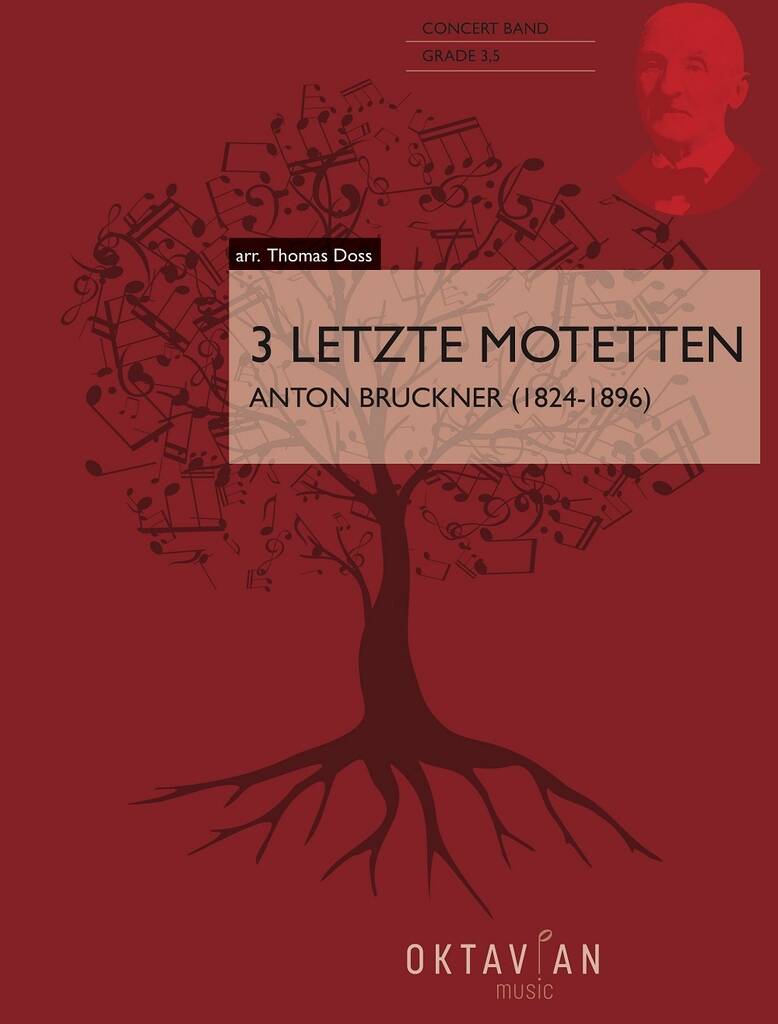 £123.20
£123.203 Letzte Motetten - Anton Bruckner
Anton Bruckner (b. 4.9.1824, Ansfelden, d. 11.10.1896, Vienna) didn't have it easy. Throughout his life, the Austrian composer was plagued by self-doubt. Anton Bruckner came from a simple, rural background. After the death of his father, he was accepted as a choirboy at the monastery of Sankt Florian in 1837. After several years as a school assistant and his own organ and piano studies, he first worked as organist in St. Florian, then from 1855 as cathedral organist in Linz. Introduced to music theory and instrumentation by Simon Sechter and Otto Kitzler, he discovered Richard Wagner as an artistic role model, whom he admired throughout his life and also visited several times in Bayreuth.In 1868 Anton Bruckner became professor of basso continuo, counterpoint and organ at the Vienna Conservatory; ten years later court organist; and in 1891 finally honorary doctor of the University of Vienna. He was considered an important organ virtuoso of his era, but had to wait a long time for recognition as a composer. It was not until Symphony No.7 in E major, composed between 1881 and 1883, with the famous Adagio written under the effects of Wagner's death, that he achieved the recognition he had hoped for, even if he was reluctant to accept it given his inclination towards scepticism and self-criticism.Anton Bruckner was a loner who did not want to follow a particular school or doctrine. He composed numerous sacred vocal works, such as his three masses, the Missa Solemnis in B flat minor (1854), the Te Deum (1881-84) and numerous motets. As a symphonic composer, he wrote a total of nine symphonies and many symphonic studies from 1863 onwards, tending to revise completed versions several times over. Bruckner's orchestral works were long considered unplayable, but in fact were merely exceptionally bold for the tonal language of their time, uniting traditions from Beethoven through Wagner to folk music, on the threshold between late Romanticism and Modernism.Anton Bruckner composed about 40 motets during his lifetime, the earliest a setting of Pange lingua around 1835, and the last, Vexilla regis, in 1892.Thomas Doss has compiled some of these motets in this volume for symphonic wind orchestra.These motets show many characteristics of personal expression, especially Bruckner's colourful harmony in the earlier works, which is in places aligned with Franz Schubert (changes between major and minor; and movements in thirds). Later works are characterised by many components which, in addition to the expanded stature of the movements, include above all a sense of the instrumentation as an outward phenomenon and the harmony as a compositional feature that works more internally. Some aspects of Bruckner's work are the result of his long period of study, which familiarised him not only with the tradition of his craft, but also gave him insights into the "modernity" of his time in such composers as Wagner, Liszt and Berlioz.From this developed his personal standpoint, which always pursues the connection between the old and the new.
Estimated dispatch 7-14 working days
